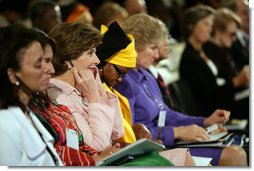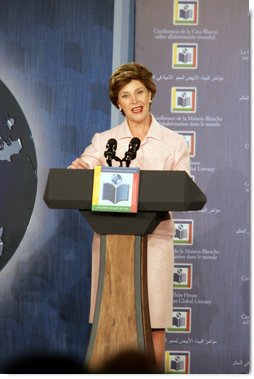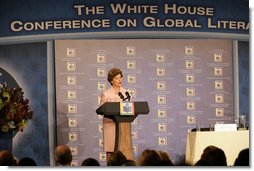|
Home >
News & Policies >
September 2006
|
For Immediate Release
Office of the First Lady
September 18, 2006
Mrs. Bush's Remarks at the White House Conference on Global Literacy
New York Public Library
New York, New York
![]() Fact Sheet: Encouraging International Cooperation to Change Lives, Build Free Societies Through Literacy
Fact Sheet: Encouraging International Cooperation to Change Lives, Build Free Societies Through Literacy
![]() White House Conference on Global Literacy
White House Conference on Global Literacy
9:16 A.M. EDT
MRS. BUSH: Thank you, Secretary Rice, for your very kind introduction, including the interesting story about your life and your grandparents.
I want to recognize the Secretary General [sic] of UNESCO, Dr. Matsuura.* Thank you very much. Today's conference is a project of UNESCO's and the United States Department of Education and the State Department. So I want to thank you very much for everything you've done to facilitate today's conference.
 Secretary Margaret Spellings, who is the United States Secretary of
Education, you'll be hearing from her later. Or have they already heard
from you? She's great, and the Department of Education has been very
important to this event, as well. The head of USAID, Ambassador Randall
Tobias, is here; Dr. Gregorian, who you heard from, the Chairman of the
Carnegie Foundation; Gerri Elliott, who is the Corporate Vice President
of Microsoft and will be one of our panel moderators; Dr. Paul LeClerc,
the President and Chief Executive Officer of the New York Public
Library; and Catie Marron, the Chair of the Board of Trustees of the New
York Public Library. Thank you all very much for this perfect venue to
talk about education.
Secretary Margaret Spellings, who is the United States Secretary of
Education, you'll be hearing from her later. Or have they already heard
from you? She's great, and the Department of Education has been very
important to this event, as well. The head of USAID, Ambassador Randall
Tobias, is here; Dr. Gregorian, who you heard from, the Chairman of the
Carnegie Foundation; Gerri Elliott, who is the Corporate Vice President
of Microsoft and will be one of our panel moderators; Dr. Paul LeClerc,
the President and Chief Executive Officer of the New York Public
Library; and Catie Marron, the Chair of the Board of Trustees of the New
York Public Library. Thank you all very much for this perfect venue to
talk about education.
First ladies, ministers of education and distinguished guests, welcome to the White House Conference on Global Literacy.
My special guests today are people I love to share books with: my mother, Jenna Welch -- (applause) -- my mother-in-law, Barbara Bush -- (applause) -- and my daughter, Barbara. (Applause.) We represent three generations of women who love to read. Reading, in fact, is so important to us -- is such a part of our lives -- that our lives have been built around it. My mother loved to read, and she taught me to love reading. I liked reading so much that I made it into my career by becoming a teacher and a librarian.
Reading is so important to my mother-in-law, Barbara Bush, that she made literacy her focus when her husband was President, and all the years since with the Barbara Bush Foundation for Family Literacy. The Barbara Bush Foundation supports programs around the United States that provide literacy instruction to children and their parents.
I suspect that I can safely say that everyone here today is here because reading -- and the love of good books and ideas -- is a central part of their lives.
Three years ago, in this very library, UNESCO launched its Decade of Literacy, a ten-year initiative to extend the benefits of reading everywhere, especially to those of the world's poorest and most marginalized communities.
Across the globe, more than 800 million people are illiterate. One hundred million children are not in school, which means they're not learning to read. And of the 771 million adults who cannot read a simple book, more than two-thirds of them are women.
To meet the Literacy Decade's goal of teaching all these men, women and children how to read, UNESCO started its Literacy Initiative for Empowerment. Eighty-five percent of the people who cannot read live in just 35 countries, and UNESCO, through its LIFE program, works with the governments of these nations to develop effective local literacy programs for their people.
 But ending illiteracy is a challenge for every country. And every
government must do its part by investing in the education of its people
-- men, women, and children; rich and poor.
But ending illiteracy is a challenge for every country. And every
government must do its part by investing in the education of its people
-- men, women, and children; rich and poor.
The investment, no matter how significant, is always worthwhile, because investing in literacy and education helps governments meet their fundamental obligations, by improving opportunities for children and families, by strengthening their economies, and by keeping their citizens in good health.
By investing in literacy instruction for women and girls now, governments ensure that future generations will enjoy the benefits of reading. Women who can read are much more likely to be advocates for their children's education.
Educating women and children requires textbooks and teachers. And in many countries, governments are working with the private sector to provide these resources. In Ghana, I visited the Accra Teacher Training College, which participates in the Textbooks and Learning Materials Program. As part of the program, six American universities have partnered with six governments of African countries to produce and distribute 15 million primary-school textbooks for African children.
The program is part of President Bush's African Education Initiative, a $600 million commitment that's already helped train more than 400,000 teachers in sub-Saharan Africa.
By investing in literacy and education, governments build their economies. When people read, they're more likely to participate in business and trade, which leads to greater economic development. And literacy helps both men and women provide for themselves, their families, and their communities. Countries prosper with an educated workforce.
The connection between literacy and economic growth can be seen in Arzu, Inc. Arzu sells traditional rugs woven by Afghan women, providing them with a job so they can support themselves and their families. Arzu also requires that weavers and their husbands sign a contract promising that all women in the household will attend literacy classes. As the women learn to read and count, they learn to manage their income and budget it wisely, and they become informed consumers.
Arzu weavers also pledge to enroll their sons and daughters in school. One of Arzu's directors, Tooba Mayel, says, and I quote: "Now, people have a short vision for their lives. They're in survival mode, looking for a day-to-day living. But these children won't have to worry about day-to-day living. They're seeing that there's a whole future out there for them." Tooba Mayel is here in the audience. (Applause.)
 By investing in education, governments increase their citizens'
health literacy. People who can read can understand the label on a food
container. They know how to follow instructions on the bottle of
medicine. They're also able to make informed decisions about their
lives that will keep them and their families healthy.
By investing in education, governments increase their citizens'
health literacy. People who can read can understand the label on a food
container. They know how to follow instructions on the bottle of
medicine. They're also able to make informed decisions about their
lives that will keep them and their families healthy.
Education is saving lives in South Africa, through the Mothers-to-Mothers-to-Be Program. At "Mothers" centers, HIV-infected women receive information and support to keep their unborn children from contracting the disease. Women who've successfully delivered HIV-negative babies can serve as mentors to other mothers. The program trains women in beading and other crafts, and then sells their crafts internationally -- offering the women an independent source of income, and greater control over their health.
I've met many of these mothers, including a young woman named Gloria. Gloria had always wanted to be a nurse, but she had to leave school at age 16 when she was forced into an arranged marriage.
Years later, when Gloria discovered she was pregnant with her second child and HIV-positive, she found Mothers-to-Mothers. In addition to helping Gloria and her baby stay healthy, the program trained Gloria as a mentor-mother, and she eventually became Site Coordinator at the largest "Mothers" center.
The education Gloria received through her Mothers-to-Mothers helped revive her dream of becoming a nurse. Now, Gloria is teaching nurses about HIV/AIDS -- showing how investing in the education of one woman can help keep many other women, and their families, in good health. Gloria. (Applause.)
Investing in literacy benefits everyone, and so I urge every government, and also private sector organizations, to dedicate your resources to this cause.
Knowing how to direct these resources requires knowing where they're needed. So today, I'm pleased to announce that the American people are contributing $1 million to support UNESCO's Literacy Assessment and Monitoring Program. Through LAMP, many countries are working to determine which people in their country cannot read, where people live who cannot read, and why people can't read.
This information will help remove obstacles to reading everywhere. For LAMP to be truly successful, it requires broad participation. I encourage all countries to join.
Today, as we discuss how to improve educational opportunities around the world, it's important to remember that we're all teachers. A person who's never stood by a blackboard still teaches by example. By demonstrating our commitment to literacy, we can let millions of people know that reading and writing are important, and we can help build a healthier, more prosperous, and more hopeful world.
Thank you all for coming today. Thanks especially to the panelists who've traveled from around the world to be here for us today. We're looking forward to your presentations. I also want to take this opportunity to thank my staff, who worked so hard to bring everyone together to address this important issue. And thanks to each and every one of you who have come today. Thank you for your commitment to literacy, and thank you for everything you do in your home countries. Thank you so very much. (Applause.)
END 9:27 A.M. EDT
* Dr. Matsuura is Director General of UNESCO.
![]() Printer-Friendly Version
Printer-Friendly Version
![]() Email This Page
Email This Page


